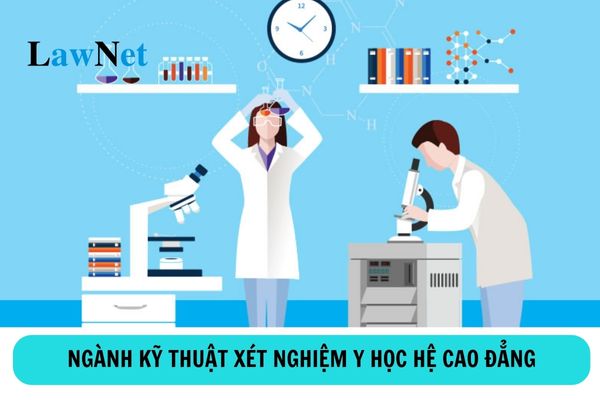Vietnam: What jobs can graduates of college-level Medical Laboratory Technology do?
What jobs can graduates of college-level Medical Laboratory Technology in Vietnam do?
Under Subsection 5, Section A, Part 3 of the Regulations on minimum knowledge and competency requirements for graduates at intermediate and college levels in the fields of health and social service (hereinafter referred to as the Regulations) issued with Circular 54/2018/TT-BLDTBXH, graduates of college-level Medical Laboratory Technology in Vietnam may do the following jobs:
- Reception and result delivery;
- Sample reception, collection, and processing;
- Hematology and blood transfusion testing;
- Biochemical and immunological testing;
- Microbiological and parasitological testing;
- Pathological and cytological testing.

What jobs can graduates of college-level Medical Laboratory Technology in Vietnam do? (Image from the Internet)
What is the general information on college-level Medical Laboratory Technology in Vietnam?
According to Subsection 1, Section A, Part 3 of the Regulations issued with Circular 54/2018/TT-BLDTBXH, the college-level Medical Laboratory Technology is described as follows:
College-level Medical Laboratory Technology is a profession that utilizes modern methods, machinery, and technological equipment to analyze biological samples such as blood, urine, and fluids to detect and provide evidence for doctors to accurately diagnose the health status of individuals using laboratory services, meeting level 5 requirements in the Vietnam National Qualifications Framework.
The laboratory work includes: welcoming patients, collecting or receiving specimens, preparing reagents, preparing equipment, performing laboratory techniques, checking, interpreting, preserving, and delivering results.
The job is mainly carried out in the laboratories of medical facilities, testing centers from central to local levels, specialized health training institutions, organizations involved in laboratory activities, CDC centers, etc.
Working conditions frequently involve exposure to patients, patient families, medical staff; chemicals, medical biological products, highly accurate testing equipment requiring laboratory technicians to have solid professional knowledge, good communication skills, the ability to withstand work pressure, meticulousness, prudence, honesty, and adherence to professional ethics and laws. The deliverables are rapid, accurate, and safe test results.
A college-level Medical Laboratory Technician has fundamental scientific knowledge, basic medical knowledge, and specialized skills to perform laboratory techniques, interpret, and analyze the results of basic tests in the fields of: Microbiology and parasitology; biochemistry, immunology; hematology and blood transfusion; pathology and cytology. They must have good health, ethical qualities, effective communication skills, high responsibility, meticulous and precise conduct; ability to self-study, update and enhance knowledge and skills to meet the healthcare needs of the community.
Minimum knowledge volume: 2,345 hours (equivalent to 90 credits).
What are the minimum requirements for skills of graduates of college-level Medical Laboratory Technology in Vietnam?
According to Subsection 3, Section A, Part 3 of the Regulations issued with Circular 54/2018/TT-BLDTBXH, graduates of college-level Medical Laboratory Technology must have the following skills:
- Proficiently preparing various buffer solutions, dyes, reagents, mediums, and using test kits for laboratory work;
- Proficiently conducting basic tests on hematology and blood transfusion, biochemistry and immunology, microbiology and parasitology, and cell tests for disease diagnosis and treatment;
- Identifying common pathogenic microorganisms; interpreting and analyzing results of biochemical immunity, basic hematology and blood transfusion tests; identifying pathological cells in inflammatory and tumor tissues;
- Organizing mass testing in communities independently or in cooperation with colleagues;
- Utilizing and maintaining laboratory equipment, chemicals, and specialized biological products;
- Controlling infection, and handling hazardous waste as per compliance with biological safety standards in the laboratory;
- Documenting, recording, and statistically keeping specialized activities as prescribed; storing and safeguarding documents in assigned fields;
- Participating in laboratory management, quality control of laboratories;
- Using basic information technology as prescribed; exploiting, processing, and applying information technology in professional job tasks;
- Using basic foreign language skills, reaching level 2/6 in Vietnam’s Foreign Language Proficiency Framework; applying foreign languages in the professional tasks of the field.

